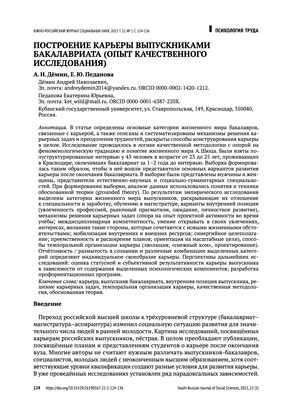Abstract
The objectives of the article are as follows: to determine the main categories of the bachelor’s life world related to career; the mechanisms for solving career problems and coping with difficulties; based on the collected material, try to reveal the ways of constructing a career as a whole. The research was carried out in the logic of qualitative methodology based on the phenomenological tradition and the concept of the life world of A. Schutz. Semi-structured interviews were conducted with 43 people aged 23 to 25 years living in Krasnodar, who had completed their bachelor’s degree 1–2 years before the interview. The sample was formed in such a way that it included representatives of the main career options after completing a bachelor’s degree; the sample included men and women, representatives of natural science and socio-humanitarian specialties. The concepts and techniques of grounded theory were used in sampling and data analysis. The categories of the graduates’ life world are identified, revealing their attitude to the specialty and earnings, training in the master’s program, options for internal position (passion for the profession, labour market pragmatism, expectation, personal development), mechanisms for solving career problems (relying on the experience of project activity during education; interdisciplinary competence, the ability to discover in their hobbies, interests, desires such aspects that are match the new life circumstances; mobilization of internal and external resources; synergistic goal-setting; continuity and expansion of plans; orientation to large-scale goals), ways of temporal career organization (evolution, “snowball”, projecting). The clarity of awareness and the different combinations of the identified categories determine the individual career. Prospects for further research: assessment of the status and subjective performance of a graduate’s career, depending on the content of the identified psychological components; development of vocational guidance programs.
Keywords
References
Бек, У. (2000). Общество риска. На пути к другому модерну. Москва: Прогресс-Традиция.
Дёмин, А.Н., Попова И.П. (2000). Способы адаптации безработных в трудной жизненной ситуации. Социологические исследования, 5, 35–46.
Дёмин, А.Н., Седых, А.Б. (2014). Психологические характеристики карьер молодёжи в первый год после окончания бакалавриата. Человек. Сообщество. Управление, 4, 118–131.
Ермолаева, М.В., Лубовский, Д.В. (2015). Особенности внутренней позиции студентов-психологов. Вопросы психологии, 3, 58–65.
Страусс, А., Корбин, Дж. (2001). Основы качественного исследования: обоснованная теория, процедуры и техники. Москва: Эдиториал УРСС.
Стэндинг, Г. (2014). Прекариат: новый опасный класс. Москва: Ад Маргинем Пресс.
Тихомиров О.К. (1984). Психология мышления. Москва: Изд-во Моск. ун-та.
Толочек, В.А. (2017). Профессиональная карьера как социально-психологический феномен. Москва: Изд-во «Институт психологии РАН».
Улановский, А.М. (2006). Качественная методология и конструктивистская ориентация в психологии. Вопросы психологии, 3, 27–37.
Хорошилов, Д.А., Мельникова, О.Т. (2018). Качественный анализ в психологии — наука или искусство? Вопросы психологии, 2, 1–10.
Шюц, А. (2004). Избранное: Мир, светящийся смыслом. Пер. с нем. и англ. Москва: «Российская политическая энциклопедия» (РОССПЭН).
Эриксон, Э. (1996). Идентичность: юность и кризис. Москва: Изд. группа «Прогресс».
Эфендиев, А.Г., Балабанова, Е.С. (2010). Профессиональная карьера выпускников факультета менеджмента. Социологические исследования, 2, 100–110.
Akkermans, J., Kubasch, S. (2017). #Trending Topics in Careers: A Review and Future Research Agenda. Career Development International, 22(6), 586–627. DOI: 10.1108/CDI‑08-2017-0143
Holland, J.L., Johnston, J.A., Asama, N.F. (1993). The Vocational Identity Scale: A Diagnostic and Treatment Tool. Journal of Career Assessment, 1(1), 1–11.
Marcia, J.E. (1996). The Importance of Conflict for Adolescent and Lifespan Development. In Leni Verhofstadt-Deneve et al. (Eds) Conflict and development in adolescence (pp. 13–19). Leiden University: DSWO Press.
Osipow, S.H. (1989). Career Issues through the Life Span. In M.S. Pallak, R. Perloff (Eds) Psychology and work: Productivity, Change, and Employment (pp. 141–168). Washington: APA.
Smale, A., Bagdadli, S., Cotton, R., Dello Russo, S. et al. (2019). Proactive Career Behaviors and Subjective Career Success: The moderating role of national culture. Journal of Organizational Behavior, 40(1), 105–122. DOI: 10.1002/job.2316
Super, D.E. (1990). A Life-Span, Life-Space Approach to Career Development. In D. Brown, L. Brooks (Eds) Career Choice and Development (pp. 167–261). San Francisco: Jossey-Bass.
Tomlinson, M. (2012). Graduate Employability: A Review of Conceptual and Empirical Themes. Higher Education Policy, 25, 407–431. DOI: 10.1057/hep.2011.26
Webley, P., Nyhus, E.K. (2008). Inter-Temporal Choice and Self-Control: Saving and borrowing. In A. Lewis (Ed.) The Cambridge Handbook of Psychology and Economic Behavior. Cambridge, UK: Cambridge University Press.


